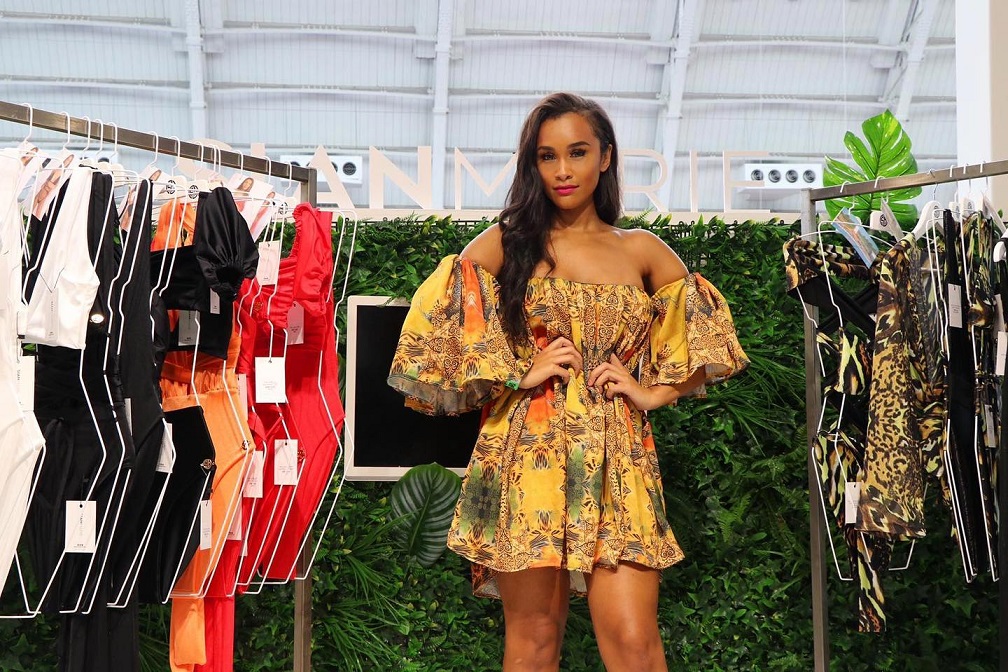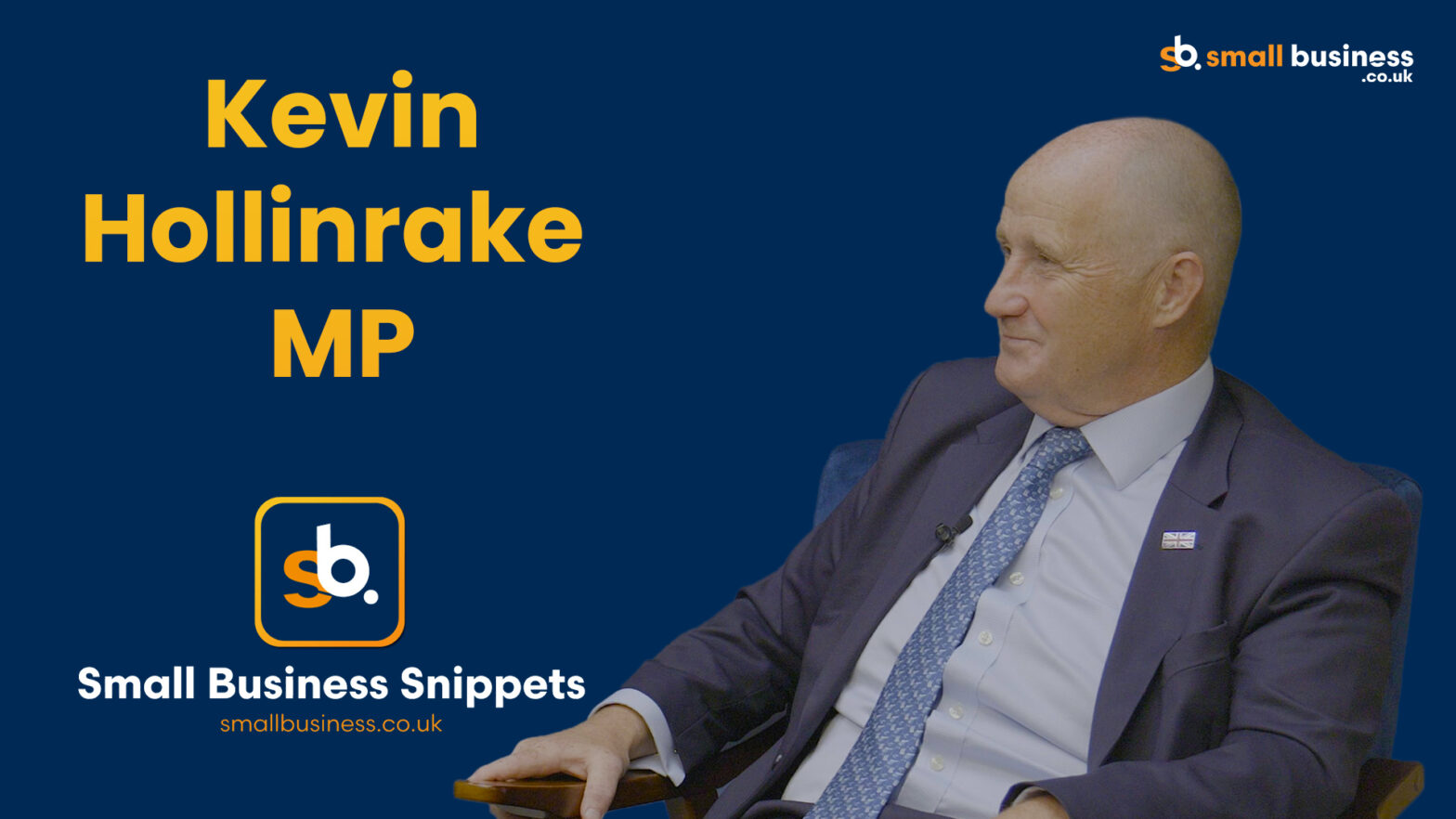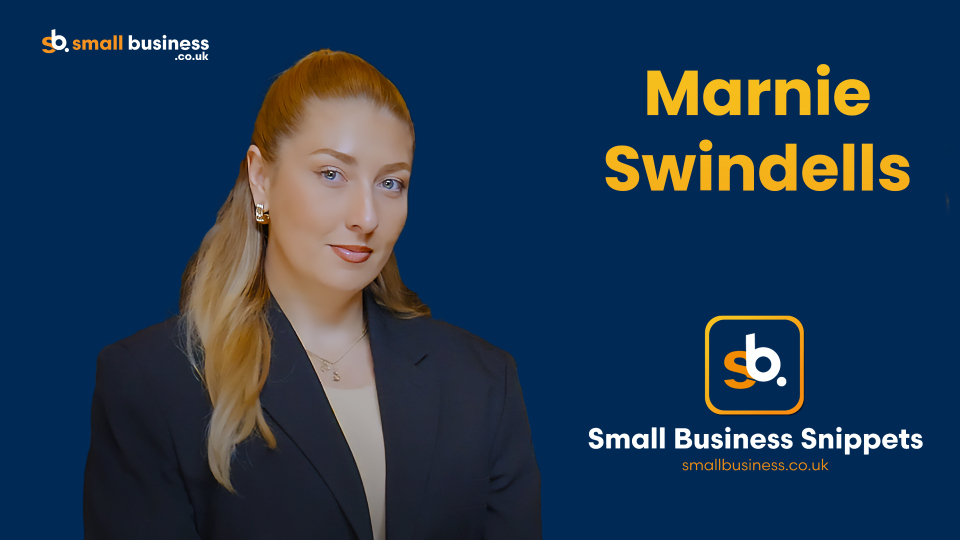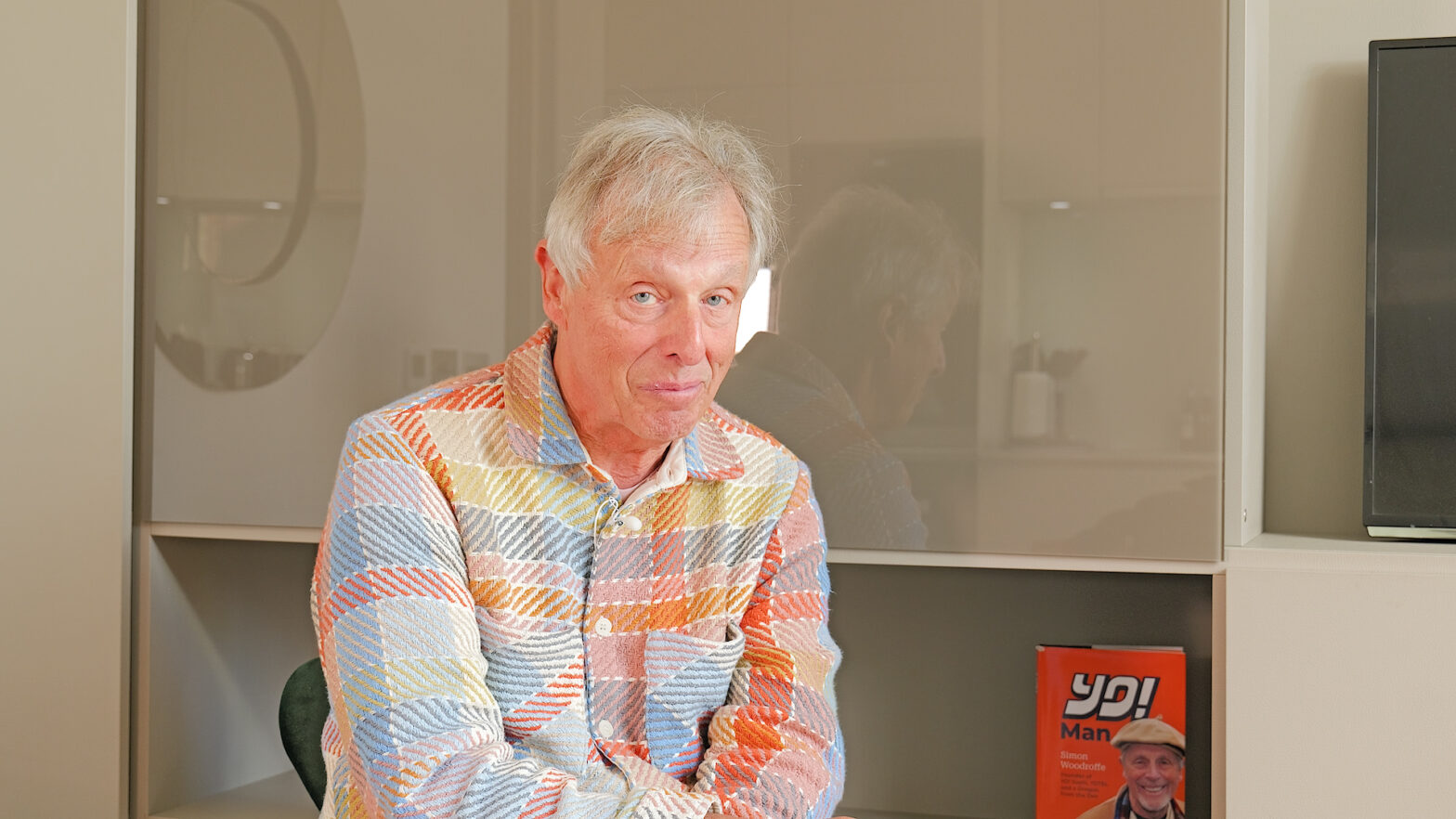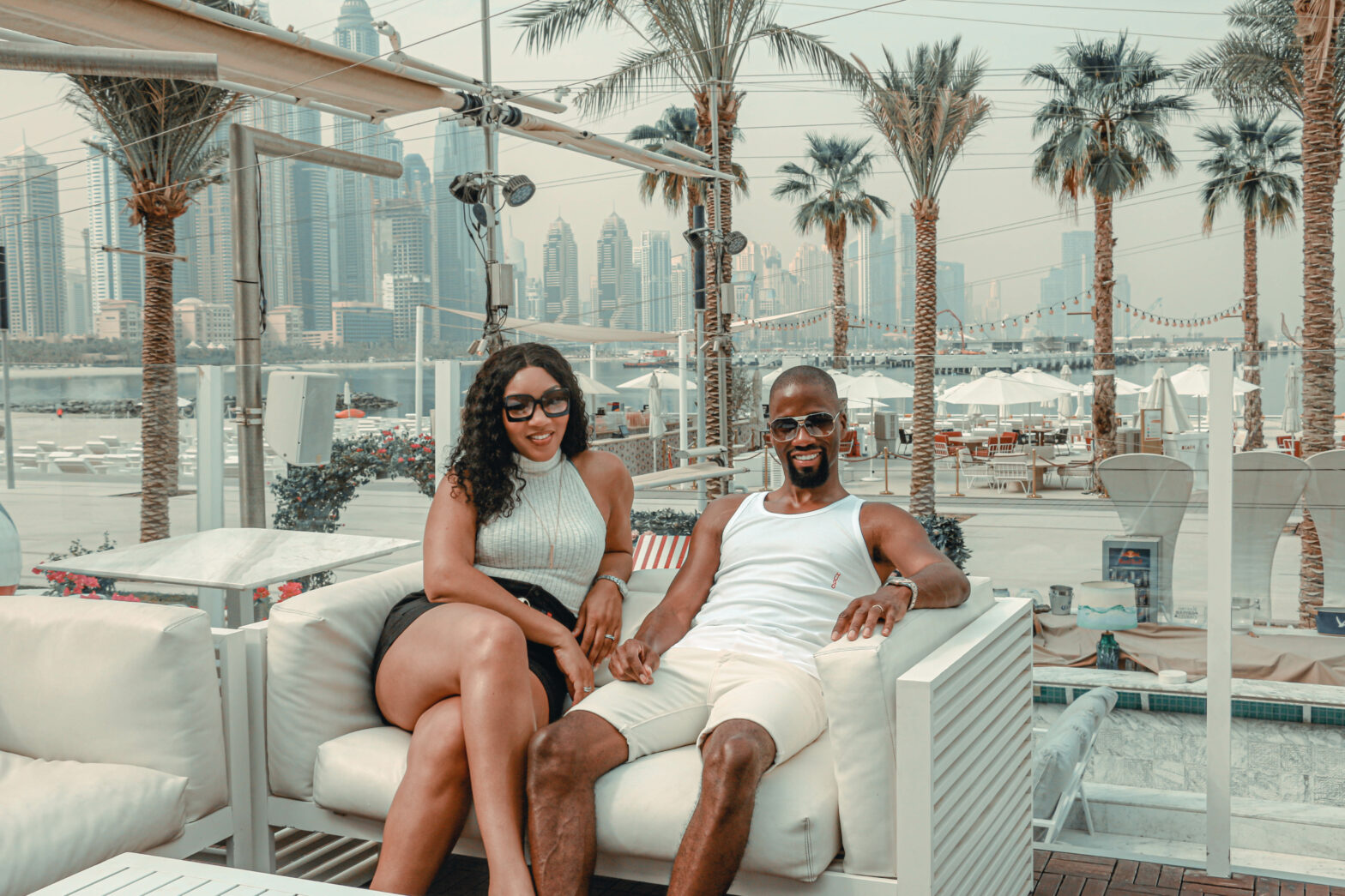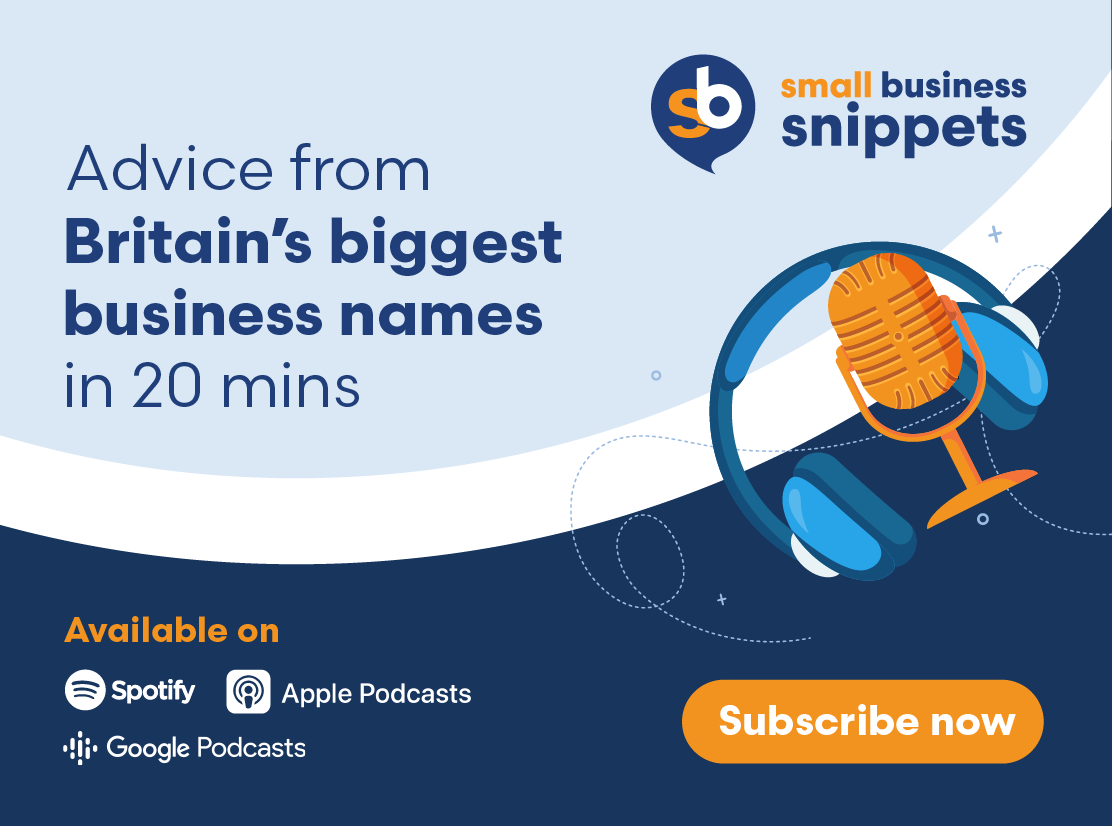Welcome to Small Business Snippets, the podcast from SmallBusiness.co.uk. Today’s guest is Sian Gabbidon, entrepreneur, TV personality and winner of The Apprentice 2018.
We discuss her favourite task on the show and social media’s depiction of entrepreneurs.
This episode was brought to you in partnership with UPS.
Listen to it in the media player below.
Alternatively, you can watch a teaser video first.
You can also catch our episodes with:
- Abel & Cole founder and chairman of Freddie’s Flowers, Keith Abel
- Entrepreneur and The Apprentice 2019 winner, Carina Lepore
- Dragon Tej Lalvani and entrepreneur Sam Jones
- Angel investor, entrepreneur and TV personality, Spencer Matthews
- Entrepreneur and former Dragon on Dragon’s Den Ireland, Lady Chanelle McCoy
- Businessman and The Apprentice winner, Mark Wright
- Entrepreneur and campaigner, Paul Lindley
- Managing director of Brompton Bikes, Will Butler-Adams
- Businessman and author, Gerald Ratner
- Entrepreneur and TV presenter, Trinny Woodall
- Pub owner and bartender on Channel 4’s First Dates, Merlin Griffiths
- Founder and chairman of Pimlico (formerly Pimlico Plumbers), Charlie Mullins
- Retail expert and former Dragon, Theo Paphitis
- Author and boardroom expert, John Tusa
- Digital guru and investor, Sherry Coutu
- Entrepreneur and former Dragon, Rachel Elnaugh
- Businesswoman and Dragon, Deborah Meaden
- Entrepreneur and The Apprentice 2005 candidate, Tim Campbell
- Gousto CEO, Timo Boldt
- Entrepreneur and The Apprentice 2018 candidate, Jackie Fast
- Investor and former Dragon, Piers Linney
- Investment fund manager, Nicola Horlick
- Supermodel turned entrepreneur, Caprice
We’ve got podcast episodes from the first series looking at:
- How one business owner’s mental breakdown caused her to see trolls from her past
- How one entrepreneur hired a videographer to track their every move and build their business brand
- How funding a business led one entrepreneur to stress-related alopecia
- One entrepreneur’s first professional public speaking engagement
- Adapting to UK life and learning English before starting a business
- Securing seed funding
- Finding the perfect head of customer care
- Reaching a £1 million annual rate of return
- Boosting client numbers from 30 to 850
- Starting a brand new business from scratch
To find out more about Small Business Snippets, you can download the trailer.
If you want to listen to the podcast elsewhere, it’s available on Apple Podcasts, Google Podcasts and Spotify. Watch the new video versions and subscribe over at our YouTube channel. It’d also be great if you could leave us a review.
Remember to like us on Facebook @SmallBusinessExperts and follow us on Twitter @smallbusinessuk, all lower case.
Sian Gabbidon podcast transcript
Hello and welcome to Small Business Snippets, the podcast from SmallBusiness.co.uk. I’m your host, Anna Jordan.
Today we have Sian Gabbidon – entrepreneur, TV personality and The Apprentice winner in 2018.
With a keen interest in fashion as a teenager, Sian did a fashion design with marketing and production degree at the University of Huddersfield. She went on to create her swimwear brand, Sian Marie, two years before appearing on The Apprentice. But with a global pandemic affecting sun-seeking holidays, Sian quickly had to pivot to loungewear, reporting a loss of £47,000 from the brand.
She’s since bounced back, partnering with George at ASDA to launch her loungewear range at the beginning of November 2021.
We’ll be talking about growing your brand on Instagram and handling a business while ill with Covid-19.
Anna: Hi, Sian.
Sian: Hello, how you doing?
Anna: I’m very well, thank you. How are you?
Sian: Yeah, not bad.
You started out posting your designs on Instagram after you graduated from university. At the time of recording, you’ve grown that following from almost 120,000 on your personal account, and almost 70,000 on your Sian Marie Loungewear account. I’m sure our listeners would love to know – how do you engage with your audience and build your brand on Instagram?
Sian: It’s a lot more difficult nowadays than it was back when I first set up. Nowadays with Instagram, you have algorithms and all kinds of things going on that can help or not help.
But for me, it was quite organic, especially back before The Apprentice on my business page. We just ended up getting quite a lot of stylists, and even celebrities and people following us because we have designs that others didn’t really have. So, we just really organically grew that following and got more and more support. Then obviously pivoting into lounge, it’s almost like a new audience has came about now as well.
When I was first using Instagram, back in the day, when I first set the brand up, it wasn’t as monetised as it is now. You weren’t really paying to get seen, you were seen automatically. Everyone that follows you will see your posts, whereas nowadays because you have to pay for posts, especially as a business, it’s a lot harder to reach the audiences. You just have to spend a bit more money now. Whereas back then it was a free for all and everyone just saw everything that you posted.
I imagine stylists were probably looking through Instagram at the time to try and find businesses like yourselves.
Sian: Definitely. I think stylists use places like Instagram for new talent. It’s perfect for those guys – they don’t have to go to a store to find things. They could literally just look online, find some really unique different designs. That’s what we were all about, especially with swimwear. It was very much one-off pieces, and pieces that you wouldn’t crash at a pool party in, so it was perfect for celebrities.
What kind of advice would you give to creative entrepreneurs now to get noticed on Instagram?
Sian: I would say now that it still does boil down to that raw talent. If you’ve got a raw talent and you create amazing designs and use the right hashtags – there’s a few tricks of the trade within Instagram that will help you get seen. But I think having that talent – and engaging with the people that you want to see – or sometimes that can work is the kind of tricks of the trade within that you can use to be seen. But I think yes, it’s mainly just about having the talent and getting your pictures on there. And pushing it as much as you can and being a consistent person, posting every single day, making the people that follow you almost know when you’re about to post so that they can be prepared for it.
There are peak times for posting. With Instagram, you should always be posting regular content without posting too much with them without not posting enough. It’s a really tricky balance because you want to keep people engaged, but you don’t want to annoy them. But I think as a designer, especially when we’re creating, if you’re creating pieces that are one-offs, get throwing them all on there and have a wall full of your work so that people, when they do find you, can just flick through and see everything.
Once you became a bit more established, were getting noticed by the stylists and everything, I believe it was an influencer who wore one of your pieces and you got recognised off the back of that as well.
Then the pandemic hit, and of course, people are not going on the sunny holidays. They’re stuck at home and you had to pivot to loungewear very, very quickly. Tell us a bit more about how you went about doing that and how long it took.
Sian: Yeah, so we were like, 90 per cent swimwear in the UK pre-pandemic, and then the pandemic hit. I think we just launched a range in the March, a full swimwear range. It was an absolute nightmare. People were sending stuff back saying that their holidays were being cancelled.
I remember first hearing about coronavirus and having a bit of a, ‘Well, we’ll see what happens. It’s probably going to be fine’. I think back to May, and then this all kicked off. And I was like, ‘Oh my gosh.’ This is destroying for my type of business. We did always plan to expand into new areas, just not as quickly as we had to do with the pandemic. It kind of forced me and us to expand quicker than we wanted to. But it’s actually, out of such a terrible time, it’s probably been the best thing that we’ve ever done. Because loungewear for me now – it’s just proven how hard swimwear is, because it’s seasonal. It’s a much smaller demographic graphic in some ways than loungewear.
And the way that, as a designer, and as a brand owner, the way that we turned around the product and made everything happen was so much quicker than it normally would be for a fashion brand. But I think I look at that now and pat myself on the back for being able to adapt it and change so quickly and react to what was going on. And yeah, survive it, I guess.
One of the key attributes of a business owner is to be nimble and to be able to adapt very quickly. You even had Covid-19 yourself – how did that affect you and the business?
Sian: Having Covid was dreadful. Even now, I can’t taste or smell. It’s so bizarre – it’s been months now. And yeah, I can’t taste or smell anything. On a personal level, having Covid myself was weird. I was more scared for family and friends, making sure that everybody else will be alright. My mum’s literally just found out she’s got Covid today. She’s an NHS nurse.
Covid itself was just such a strange thing to live through and to be a business owner through. Every business on the planet was affected in some way by it. And it’s sad that some of them didn’t make it. But you know, luckily for me, I could adapt. I was on the ball and I was involved. I think sometimes people think I’m just sat on a beach enjoying life. It’s really not like that as a business owner – not for me anyway.
Yeah, absolutely. I think there’s a thing with entrepreneurs, especially on social media, where they’re sort of living the highlife and having a good time, but I think there’s less of the imagery of, I don’t know, sitting with a planning board at three in the morning and that kind of thing.
Sian: Social media is amazing. But I think it does depict entrepreneurs and business owners in a certain light that makes everything look glamorous, which is what it 100 per cent is at times. But then there’s a lot of the time where it’s just hard work. You work long hours, you’re full-on, there are a lot of hurdles, a lot of stresses. I think that’s why probably a lot of start-ups struggle or they don’t make it past certain hurdles, because they’re expecting everything to be rosy and it really isn’t. Even in my position now, we’re doing really well, we’re growing and we’re going in the right direction, and I’m in a really happy place. But there are still hurdles, there are still issues, there are still stresses every single day, but as a business owner and an entrepreneur, are you ready for that? You’re ready to attack that and to keep going.
What’s the most stressful thing you face as an entrepreneur? How do you tackle it?
Sian: One of the things that I struggle with as an entrepreneur, it’s a very funny one and I’m sure others would agree, is letting go of things and letting other people do them or manage them. My business, I started myself in my bedroom and I know every single part of the business, even now. And I think it’s hard. I am all about my brand so everything I do is about the brand. And I care. And I think sometimes just letting other people manage things and having a team of people who you need around you, but then allowing them to do it for you. I really struggle with it even now, you have to as the business grows, but I like to do everything myself. I can’t – you can’t do everything yourself.
Is that just a case of, ‘Okay, breathe’? Let them do the thing, trust them? Or is there something specific that you do to try and ease that anxiety?
Sian: I think to help with that, it’s about employing the right people. It’s about making sure that they’re well-trained and know what they’re doing, and that they know you’re there if they need help. If they really need to speak to somebody or ask someone. For me, it’s making sure you’ve got the right people in place for the job. And then allowing yourself to be open to questions and giving help if you need to.
Great. And another challenge that’s coming up that may affect you, is the possible regulation of the Buy Now Pay Later (BNPL) market? Because I understand that you use a BNPL facility on the site. It’s still under consultation at the moment, but how do you think that’s going to change that side of the business for you as a retailer?
Sian: Are they saying they’re not going to allow it anymore?
Anna: No, it’s just that it might be regulated, like other credit facilities – credit cards and so on. So, it’s more stringent checks and being more lenient with people who are struggling to make repayments and that kind of thing. But it looks like the retailers might have to be authorised by the Financial Conduct Authority as well.
Sian: In terms of Buy Now Pay Later, and we do have it on our site, it does come in handy.
The majority of our sales are just bought directly, through PayPal or credit card. So, depending on how that works, it might affect us slightly, but I think anything that’s going to make people safer and help avoid them getting themselves into debts or anything like that, then, as a business owner, you’ve got to make sure people are safe, that’s the priority.
You started the business on a very low budget. What kind of advice would you have for, say, sole traders or entrepreneurs who want to start a business on a low budget?
Sian: Anyone wanting to start a business on a low budget, I would say, don’t be put off by that. And it actually was, I think, I would personally say it was great for me because it taught me how to be smart with money and how to reinvest profits. I worked full-time when I first set the business up, didn’t take any money out of the business for myself for quite a while I just built the pot. And luckily working allowed me to do that. And me having really early mornings and really late nights to manage your business and a full-time job. But that was my plan. I didn’t want to put too much pressure on making money to begin with, it was more about getting the right things in place, having the website, having some cash saved up for any rainy days or anything that I need it for. I would just say, you definitely can do it, you just have to be very smart about planning and money management.
I’d like to talk a little bit about The Apprentice and your time on it. So yeah, you got right through to the final. What was the most memorable task for you and why?
Sian: The most memorable task for me in The Apprentice was definitely the QVC task, like selling on TV. I remember taking a massive punt and saying, ‘Right, I’m going to pick the most expensive product that we could choose from.’ And in my head, I kind of said to myself, ‘If we win, amazing. If we don’t win, I’m probably going to get kicked off for this task.’ But it was one where I thought, ‘You know what? I’m going to take a risk and I’m going to hope that Lord Sugar appreciates me taking the risk. And luckily, I think we won – I’m pretty sure that we won that task. And everything paid off for me. So yeah, that was my favourite one.
Right at the very end, you and Camilla, you seemed to – not as much as other years – but you seem to be in quite a head-to-head with a lot of arguing. Then all of a sudden, once Lord Sugar had made the announcement, it’s as if something just fell.
And you’re not best friends. But you know, you kind of made up again. Tell us what it’s like being in that final, that final meeting room scenario.
Sian: At the time, we were actually really good friends. And we were very similar age-wise and interests, whatever else. So, it was a really strange situation because it was like we were really buzzing for each other when the fan then you were competing against each other. But we knew that when we were in front of Lord Sugar and was in the final grilling, we kind of knew the situation. And we knew that we’d have to say things about each other’s businesses and about each other. And I think we just kind of took it and ran with it.
But we knew that off-camera and behind the scenes, we were friends, and we genuinely would have been whoever, whatever the outcome would have been and whoever would have won, we would have been happy. Had that been coming I would have been absolutely pausing for. It was a really strange one. But what obviously for me, I’ll never forget the moment that I won. But then being in the final was another thing that I’ll never forget either because it was a girl power final.
Were you encouraged to ham it up or was that all real?
Sian: Everything on the show is real. Everything that you see is real. It’s emotional. You’ve been in there for a long time, we’re tired, you’ve been doing all these tasks. And especially by the final I was a bit like, I’m so competitive as well, that I was like by this stage, ‘If I don’t win now, I’m going to be absolutely fuming.’ So fine. I was like, ‘I’m knackered, but this is the final hurdle now and I need to win it.’ You know, I would have kicked myself if I’d came second.
Anna: Well, great. I mean, that seems like a great place to wrap up. Thank you so much for coming on the podcast. Yeah. And it’s been wonderful to have you.
Sian: Thank you for having me. It’s been great.
You can find out more about Sian Marie at sianmarie.com. You can also visit SmallBusiness.co.uk for more about growing your brand on social media. Remember to like us on Facebook @SmallBusinessExperts and on Twitter @smallbusinessuk (all lower case) and subscribe to our YouTube channel, linked in the description. Until next time, thank you for listening.
